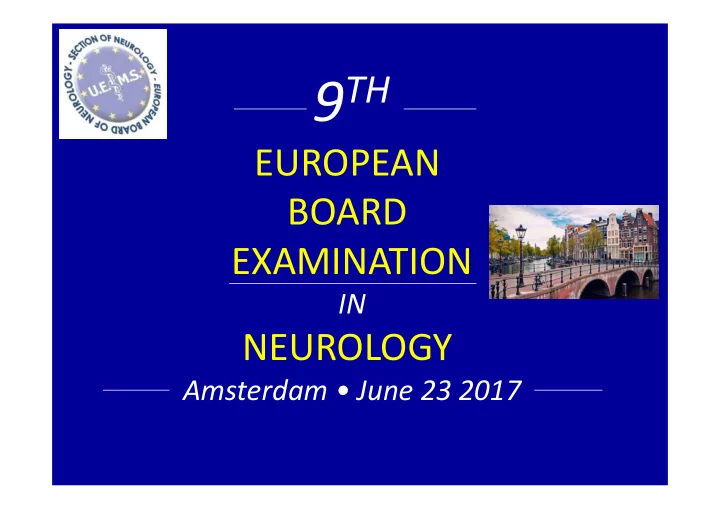

9 TH EUROPEAN BOARD EXAMINATION IN NEUROLOGY Amsterdam • June 23 2017
Why setting up a European board Examination ?
The European Board of Neurology aims at Harmonisation of Postgraduate Training of Specialists.
But why setting up an Examination ?
Because………….
Candidates’ opinions* The value of an Exam anyway • It should be a statement of excellence if properly managed. • Improving education • The questions and exam modules really test the ability of the candidate in way that covers all the fields in practical work. • Important to get more experience • It is always good to be able to test knowledge especially by an objectively constructed exam. • It helps for an external validation of my knowledge. *Survey taken at the Berlin Examination 2015
Survey* Do you feel a European board exam useful while having other postgraduate exams available as well? 0 2 4 14 22 Disagree 1 2 3 4 5 Agree *Survey taken at the Berlin Examination 2015
Is this an individual initiative of neurologists ? No! it isn‘t
European Examinations Allergology and clinical Immunology Oral Surgery Anaestesiology Orthopedics and Traumatology Cardiovascular Surgery Otolaryngology Dermatology and Venerology Pathology Endocrine Surgery Pediatric Surgery Gastrointestinal Medicine Pulmonology General Surgery Rehabilitation Medicine Hand Surgery Reconstructive Surgery Internal Medicine Surgical Oncology Intensive Care Transplantation Medicine Neurology Urology Neurosurgery Vascular diseases Nuclear Medicine Vascular Surgery Ophthalmology
How many candidates take the Exam ? In 2016 we had 72 participating candidates We are aiming at far more!
Is the examination only for Europeans? No! Other participants are most welcome as well.
Copenhagen 2016
Albania 1 Norway 1 Morocco 1 Austria 1 Poland 2 Tunesia 1 Azerbaijan 2 Portugal 4 Egypt 5 Belgium 6 Spain 2 Sudan 5 Denmark 1 Turkey 5 Iraq 1 France 2 Saudi Arabia 6 Germany 6 Syria 1 Ireland 1 Jordania 1 Italy 6 Pakistan 1 Macedonia 1 India 3 Malta 2 USA 2 Netherlands 1 Japan 1 72 candidates participated
Is there an admission fee?
Which competencies will be tested?
7 1 We do not only want to test dry knowledge but 2 4 other competencies as 3 well. 5 6 We do not want to take a snapshot on the day of the examination, we want to test your competencies from daily life.
7 1 Therefore we also test ‐ Problem solving 2 4 ‐ Presentation abilities 3 ‐ Handling knowledge 5 ‐ Ethics and Public Health 6 We allow you to do part of the exam at your own desk and to use your own books during the Exam!
This is what we want to avoid…….
How can we prepare ourselves?
About 80% has been taken from the following sources Electronic European Textbook Courses Guidelines (EAN) (EAN)
How will this be examined?
Knowledge (80%) • About 100 Multiple Choice Questions • Basic and Clinical sciences following our Core Curriculum, see website • ± 70% Open Book
MCQ closed Book
MCQ open Book A 60 ‐ year ‐ old female patient is treated for rheumatoid arthritis with methotrexate. She develops a syndrome with headache, fever, vomiting in a couple of days. Her GP prescribed ampicillin, suspecting her from a lower airway infection. Thereafter she developed a meningitis with involvement of the right facial and left oculomotor nerve. Lumbar puncture revealed increased intrathecal pressure with milky CSF with polymorphonuclear pleocytosis (>6000/cc), low sugar and increased protein. 15. What should be added to the antibiotic regimen, given these results, whilst waiting for further CSF analysis? a. Aciclovir. b. Amphotericin. c. Ceftriaxone. d. Gentamycin. e. Tuberculostatics.
Other competencies • Public Health, Ethics, Handling Knowledge • This can be prepared at home. • Essays and a presentation should be sent in for an oral examination*. See also www.uems ‐ neuroboard.org *Scanning for plagiarism!
Total Results Excellent 4% Good 56% Fair 20% Borderline 13% ‐‐‐‐‐‐‐‐‐‐‐‐‐‐‐‐‐‐‐‐‐‐‐‐‐‐‐‐‐‐‐‐‐‐ Fail 7% Copenhagen 2016
Why should we take this examination?
To help you migrating within Europe To show your level of excellence and to become a Fellow of the European Board of Neurology
More Information ?
www.uems ‐ neuroboard.org and j.b.m.kuks@umcg.nl
Survey* Are you satisfied with the information given before the exam and with the help by e-mail? 0 0 3 9 38 Disagree 1 2 Agree 3 4 5 *Survey taken at the Berlin Examination 2015
Looking forward to seeing all of you in Amsterdam
Recommend
More recommend